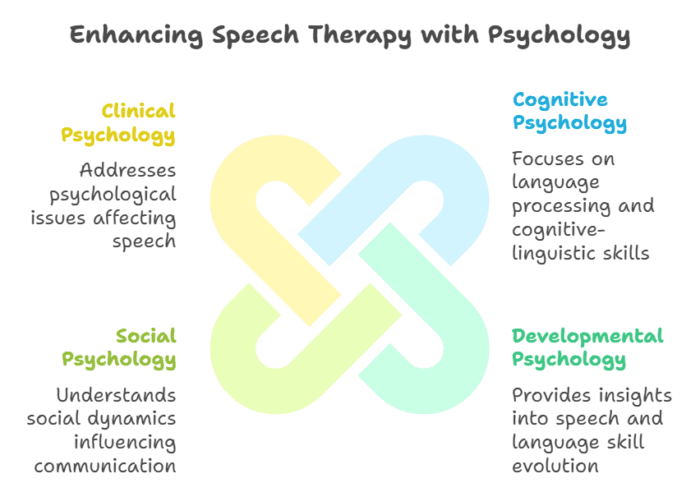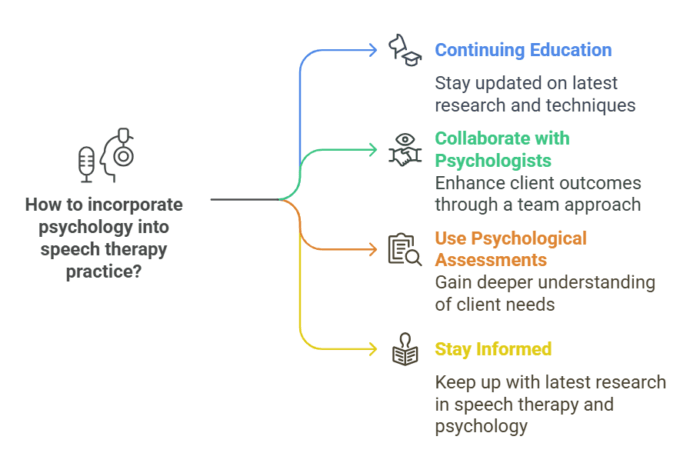
Did you know that 1 in 12 children in the U.S. has a speech, language, or voice disorder. Or that adults recovering from strokes or traumatic brain injuries often face communication challenges that go beyond physical limitations.
These statistics highlight a critical truth: speech therapy is about more than just correcting speech—it’s about understanding the mind behind the words.
This is where psychology comes in. But how exactly does psychology play a role in speech therapy, and why is it so important.
In this article, we’ll explore the powerful connection between psychology and speech therapy, uncovering how psychological principles enhance treatment outcomes for both children and adults.
By the end, you’ll understand why psychology is not just useful but essential for effective speech therapy programs. Ready to dive in? Let’s explore how the mind and speech work together to create meaningful communication.
Table of Contents
Traditional Speech Therapy Techniques vs. Psychology-Based Techniques
When it comes to speech therapy, many people focus on the technical aspects—articulation, phonetics, and language development.
But what about the role of psychology? Is psychology useful for a speech therapy program? The short answer is: absolutely.
Psychology plays a crucial role in understanding the mental and emotional factors that influence speech and communication.
In this article, we’ll explore how psychology integrates with speech therapy, why it’s essential, and how it can enhance the effectiveness of speech therapy programs.
By the end, you’ll have a clear understanding of the symbiotic relationship between psychology and speech therapy, and how this knowledge can be applied in real-world scenarios.
| Technique | Traditional Speech Therapy | Psychology-Based Approach |
|---|---|---|
| Focus | Correcting speech sounds, articulation | Addressing emotional, cognitive, and behavioral factors |
| Example | Phonetic exercises for stuttering | Cognitive-behavioral therapy (CBT) for anxiety-related stuttering |
| Outcome | Improved speech fluency | Reduced anxiety, improved confidence, and fluency |
| Best For | Clients with mild speech disorders | Clients with emotional or psychological barriers to speech |
Why Psychology Matters in Speech Therapy
Speech therapy isn’t just about correcting speech sounds or improving language skills. It’s about understanding the person behind the speech. Psychology provides the tools to delve into the cognitive, emotional, and social factors that affect communication.
Here’s why psychology is indispensable in speech therapy:
1- Understanding the Mind-Body Connection:
Speech is a complex process that involves both the brain and the body. Psychological principles help speech therapists understand how mental states, such as anxiety or depression, can impact speech production and fluency.
For example, a person who stutters may experience increased difficulty speaking when they are anxious. By understanding the psychological triggers, a speech therapist can develop strategies to manage anxiety, thereby improving speech fluency.
2- Behavioral Insights:
Many speech disorders, such as stuttering or selective mutism, have behavioral components. Psychology offers strategies like cognitive-behavioral therapy (CBT) to address these issues effectively.
For instance, CBT can help individuals who stutter identify negative thought patterns that exacerbate their condition and replace them with more positive, constructive thoughts.
3- Emotional Support:
Speech therapy can be emotionally challenging for clients, especially children. A background in psychology equips therapists with the skills to provide emotional support and build trust, which is crucial for successful therapy outcomes.
For example, a child with a speech delay may feel frustrated or embarrassed. A therapist with psychological training can help the child navigate these emotions, making the therapy process more effective and less stressful.
4- Tailored Interventions:
Every individual is unique, and psychology helps therapists tailor interventions to meet the specific needs of each client. This personalized approach increases the likelihood of positive outcomes.
For example, a therapist might use different techniques for a child with autism compared to an adult recovering from a stroke, based on their psychological and emotional needs.
The Intersection of Psychology and Speech Therapy

The fields of psychology and speech therapy overlap in several key areas. Let’s break down how psychology enhances speech therapy programs:
1- Cognitive Psychology:
This branch of psychology focuses on how people think, learn, and remember. In speech therapy, cognitive psychology helps therapists understand how clients process language and develop strategies to improve cognitive-linguistic skills.
For example, a therapist might use memory exercises to help a client with aphasia (a language disorder caused by brain damage) improve their ability to recall words.
2- Developmental Psychology:
Understanding the stages of human development is crucial for speech therapists, especially when working with children.
Developmental psychology provides insights into how speech and language skills evolve over time and how to address delays or disorders.
For instance, a therapist working with a toddler who has a speech delay might use play-based activities that are developmentally appropriate to encourage language development.
3- Social Psychology:
Communication is inherently social. Social psychology helps speech therapists understand the social dynamics that influence communication, such as peer pressure, social anxiety, or cultural differences.
For example, a therapist might work with a teenager who has social anxiety to help them feel more comfortable speaking in group settings, such as classrooms or social gatherings.
4- Clinical Psychology:
For clients with severe speech disorders or those recovering from traumatic events (e.g., stroke or brain injury), clinical psychology offers therapeutic techniques to address underlying psychological issues that may be affecting speech.
For example, a therapist might use trauma-focused therapy to help a client who has experienced a traumatic event that has impacted their ability to speak.
Practical Applications of Psychology in Speech Therapy
Now that we’ve established the importance of psychology in speech therapy, let’s look at some practical applications:
1- Assessment and Diagnosis:
Psychological assessments can help identify underlying issues that may be contributing to speech disorders. For example, a child with a language delay may also have an undiagnosed learning disability or ADHD.
A comprehensive assessment that includes psychological testing can lead to more accurate diagnoses and more effective treatment plans.
For instance, a therapist might use standardized tests to assess a child’s cognitive abilities, emotional state, and social skills, in addition to their speech and language skills.
2- Therapeutic Techniques:
Many speech therapists use psychological techniques in their practice. For example, relaxation techniques from psychology can help clients with stuttering reduce anxiety and improve fluency. Similarly, positive reinforcement, a concept from behavioral psychology can motivate clients to practice their speech exercises.
For instance, a therapist might use a reward system to encourage a child to complete their speech homework.
3- Parent and Caregiver Training:
Psychology also plays a role in educating parents and care givers. Speech therapists often teach parents how to use psychological principles, such as positive reinforcement or active listening, to support their child’s speech development at home.
For example, a therapist might provide parents with strategies to encourage their child to practice speaking in a low-pressure, supportive environment.
4- Group Therapy:
Social psychology principles are often applied in group therapy settings. Group therapy can help clients practice their communication skills in a supportive environment, which can be particularly beneficial for individuals with social anxiety or autism spectrum disorder.
For example, a therapist might lead a group session where clients take turns speaking and providing feedback to one another, helping them build confidence and improve their social communication skills.
Psychological Tests Used in Speech Therapy
| Test | Purpose | Example Use Case |
|---|---|---|
| IQ Test | Assess cognitive abilities | Identify learning disabilities in children |
| Anxiety Scale | Measure anxiety levels | Evaluate anxiety in clients who stutter |
| Social Communication Questionnaire | Assess social skills | Diagnose autism spectrum disorder (ASD) |
| Memory Test | Evaluate short-term and long-term memory | Assess memory issues in stroke patients |
Case Studies: Psychology in Action
To illustrate the real-world impact of psychology in speech therapy, let’s look at a few case studies:
Case Study 1: Stuttering and Anxiety:
A 10-year-old boy with a severe stutter was referred to a speech therapist. The therapist noticed that the boy’s stuttering worsened in stressful situations, such as speaking in front of the class.
By incorporating cognitive-behavioral therapy (CBT) techniques, the therapist helped the boy manage his anxiety, which in turn improved his fluency.
The therapist worked with the boy to identify specific situations that triggered his anxiety and developed coping strategies, such as deep breathing exercises and positive self-talk.
Case Study 2: Selective Mutism:
A 7-year-old girl with selective mutism (a condition where a child is unable to speak in certain social situations) was treated by a speech therapist with a background in psychology.
The therapist used play therapy and gradual exposure techniques to help the girl feel more comfortable speaking in different settings. Over time, the girl began to speak more freely, first in one-on-one sessions with the therapist and eventually in group settings with her peers.
Case Study 3: Stroke Recovery:
A 65-year-old man recovering from a stroke experienced aphasia, a condition that affects the ability to speak and understand language.
His speech therapist used principles from neuropsychology to design a rehabilitation program that addressed both his language skills and his emotional well-being.
The therapist incorporated activities that stimulated the man’s cognitive abilities, such as memory games and problem-solving tasks, while also providing emotional support to help him cope with the frustration of his condition.
The Role of Psychology in Different Speech Therapy Settings
Psychology is useful in various speech therapy settings, including:
Schools:
In educational settings, speech therapists often work with children who have speech and language disorders.
A background in psychology helps therapists understand the emotional and social challenges these children face, such as bullying or low self-esteem, and address them effectively.
For example, a therapist might work with a child who has a speech delay and is being teased by classmates. The therapist could use psychological techniques to help the child build resilience and improve their social skills, in addition to working on their speech.
Hospitals and Clinics:
In medical settings, speech therapists often work with patients recovering from strokes, traumatic brain injuries, or surgeries that affect speech.
Psychology helps therapists address the emotional trauma that often accompanies these conditions.
For example, a therapist might use trauma-focused therapy to help a patient who has experienced a traumatic brain injury and is struggling with both speech and emotional regulation.
Private Practice:
In private practice, speech therapists may work with clients of all ages, from toddlers with speech delays to adults with voice disorders.
Psychology allows therapists to provide a holistic approach that addresses both the physical and emotional aspects of speech disorders.
For example, a therapist might work with an adult client who has a voice disorder and is experiencing anxiety related to their condition. The therapist could use psychological techniques to help the client manage their anxiety while also working on vocal exercises to improve their speech.
Common Misconceptions About Psychology in Speech Therapy
Despite its importance, there are some misconceptions about the role of psychology in speech therapy. Let’s debunk a few of them:
Misconception 1: Psychology is only for mental health issues:
While psychology is often associated with mental health, it’s also about understanding human behavior and cognition. In speech therapy, psychology helps therapists understand how the brain processes language and how emotions affect communication.
For example, a therapist might use psychological principles to understand why a client with aphasia struggles to recall certain words, even though their memory is otherwise intact.
Misconception 2: Speech therapists don’t need to know psychology:
While speech therapists are not psychologists, a basic understanding of psychology is essential for providing effective therapy.
Many speech therapy programs include coursework in psychology to prepare therapists for the psychological aspects of their work.
For example, a speech therapist might take a course in developmental psychology to better understand the cognitive and emotional development of children with speech delays.
Misconception 3: Psychology makes speech therapy too complicated:
On the contrary, psychology simplifies speech therapy by providing a framework for understanding the complex interplay between the mind and speech.
It helps therapists identify the root causes of speech disorders and develop targeted interventions.
For example, a therapist might use psychological assessments to determine whether a child’s speech delay is related to a cognitive issue, an emotional issue, or both, and then develop a treatment plan accordingly.
How to Incorporate Psychology into Your Speech Therapy Practice

If you’re a speech therapist looking to incorporate more psychology into your practice, here are some actionable steps:
1- Take Continuing Education Courses:
Many organizations offer courses on the intersection of psychology and speech therapy. These courses can help you stay up-to-date on the latest research and techniques.
For example, you might take a course on cognitive-behavioral therapy (CBT) for speech disorders, which would teach you how to use CBT techniques to help clients manage anxiety related to their speech.
2- Collaborate with Psychologists:
If you’re working with a client who has complex psychological needs, consider collaborating with a psychologist. A team approach can lead to better outcomes for the client.
For example, you might work with a psychologist to develop a treatment plan for a client with both a speech disorder and a mental health condition, such as depression or anxiety.
3- Use Psychological Assessments:
Incorporate psychological assessments into your evaluation process to gain a deeper understanding of your client’s needs.
For example, you might use a standardized test to assess a client’s cognitive abilities, emotional state, and social skills, in addition to their speech and language skills.
4- Stay Informed:
Keep up with the latest research in both speech therapy and psychology. Journals like The Journal of Speech, Language, and Hearing Research often publish studies on the psychological aspects of speech disorders.
For example, you might read a study on the effectiveness of mindfulness techniques in reducing anxiety in clients who stutter.
In summary, psychology is not just a complementary field to speech therapy—it’s a cornerstone. From understanding the mind-body connection to applying behavioral techniques like cognitive-behavioral therapy (CBT)
Psychology provides the tools to address the emotional, cognitive, and social factors that influence communication.
Whether it’s helping a child overcome selective mutism, supporting an adult recovering from a stroke, or tailoring interventions to individual needs, psychology enhances the effectiveness of speech therapy in profound ways.
The importance of integrating psychology into speech therapy cannot be overstated. It allows therapists to treat the whole person, not just the speech disorder.
If you’re a speech therapist, consider taking steps to deepen your understanding of psychology—whether through continuing education, collaboration with psychologists, or incorporating psychological assessments into your practice.
For parents, educators, or anyone interested in communication disorders, recognizing the role of psychology can help you better support those in need.
So, the next time you hear someone struggling to speak, ask yourself: What’s happening beneath the surface? The answer might just change how you see speech therapy—and the people it helps—forever.

